
The Socratic method is a form of cooperative argumentative dialogue between individuals, based on asking and answering questions to stimulate critical thinking and to draw out ideas and underlying presuppositions. It is named after the Classical Greek philosopher Socrates and is introduced by him in Plato's Theaetetus as midwifery because it is employed to bring out definitions implicit in the interlocutors' beliefs, or to help them further their understanding.
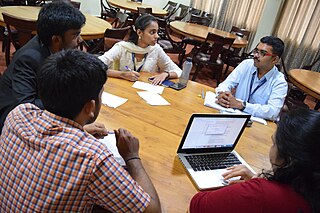
A focus group is a group interview involving a small number of demographically similar people or participants who have other common traits/experiences. Their reactions to specific researcher/evaluator-posed questions are studied. Focus groups are used in market research to understand better people's reactions to products or services or participants' perceptions of shared experiences. The discussions can be guided or open. In market research, focus groups can explore a group's response to a new product or service. As a program evaluation tool, they can elicit lessons learned and recommendations for performance improvement. The idea is for the researcher to understand participants' reactions. If group members are representative of a larger population, those reactions may be expected to reflect the views of that larger population. Thus, focus groups constitute a research or evaluation method that researchers organize to collect qualitative data through interactive and directed discussions.

During presidential election campaigns in the United States, it has become customary for the candidates to engage in a debate. The topics discussed in the debate are often the most controversial issues of the time, and arguably elections have been nearly decided by these debates. Candidate debates are not constitutionally mandated, but they are now considered an intrinsic part of the election process. The debates are targeted mainly at undecided voters; those who tend not to be partial to any political ideology or party.

An Internet forum, or message board, is an online discussion site where people can hold conversations in the form of posted messages. They differ from chat rooms in that messages are often longer than one line of text, and are at least temporarily archived. Also, depending on the access level of a user or the forum set-up, a posted message might need to be approved by a moderator before it becomes publicly visible.
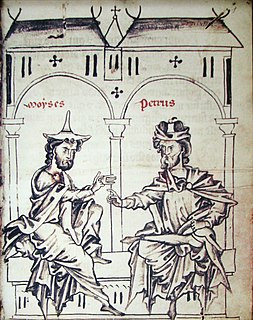
Debate is a process that involves formal discourse on a particular topic, often including a moderator and audience. In a debate, arguments are put forward for often opposing viewpoints. Debates have historically occurred in public meetings, academic institutions, debate halls, coffeehouses, competitions, and legislative assemblies. Debate has also been conducted for educational and recreational purposes, usually associated with educational establishments and debating societies. These debates put an emphasis upon logical consistency, factual accuracy, and emotional appeal to an audience. Modern forms of competitive debate also include rules for participants to discuss and decide upon the framework of the debate.

Question Time is a topical debate programme, typically broadcast on BBC One at 10:45 pm on Thursdays. It is usually repeated on BBC Two and on BBC Parliament, later in the week. If there is a Leaders special, it would be simulcasted on BBC News. Question Time is also available on BBC iPlayer. Fiona Bruce currently chairs the show having succeeded David Dimbleby as presenter in January 2019.

Town hall meetings, also referred to as town halls or town hall forums, are a way for local and national politicians to meet with their constituents either to hear from them on topics of interest or to discuss specific upcoming legislation or regulation. During periods of active political debate, town halls can be a locus for protest and more active debate. The term originates mainly from North America, and is unfamiliar in British English where politicians instead hold surgeries.
A deliberative opinion poll, sometimes called a deliberative poll, is a form of opinion poll that incorporates the principles of deliberative democracy. Professor James S. Fishkin of Stanford University first described the concept in 1988. The typical deliberative opinion poll takes a random, representative sample of citizens and engages them in deliberation on current issues or proposed policy changes through small-group discussions and conversations with competing experts to create more informed and reflective public opinion. A typical polling utilizes participants drawn from a random and representative sample to engage in small-group deliberations to create more informed and reflective public opinion. Deliberative polls have been tested around the world, including in the European Union, the United States, China, and Australia.

The Internet Governance Forum (IGF) is a multistakeholder governance group for policy dialogue on issues of Internet governance. It brings together all stakeholders in the Internet governance debate, whether they represent governments, the private sector or civil society, including the technical and academic community, on an equal basis and through an open and inclusive process. The establishment of the IGF was formally announced by the United Nations Secretary-General in July 2006. It was first convened in October–November 2006 and has held an annual meeting since then.
The positivism dispute was a political-philosophical dispute between the critical rationalists and the Frankfurt School in 1961, about the methodology of the social sciences. It grew into a broad discussion within German sociology from 1961 to 1969. The naming itself is controversial, since it was the Frankfurt School proponents who accused the critical rationalists of being positivists—while the latter considered themselves to be opponents of positivism.
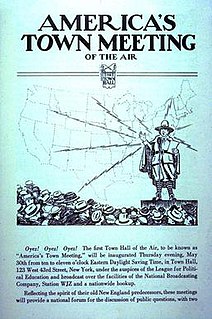
America's Town Meeting of the Air was a public affairs discussion broadcast on radio from May 30, 1935, to July 1, 1956, mainly on the NBC Blue Network and its successor, ABC Radio. One of radio's first talk shows, it began as a six-week experiment, and NBC itself did not expect much from it.
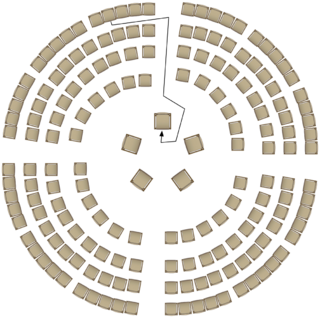
A fishbowl conversation is a form of dialogue that can be used when discussing topics within large groups. Fishbowl conversations are sometimes also used in participatory events such as unconferences. The advantage of fishbowl is that it allows the entire group to participate in a conversation. Several people can join the discussion.
Debates took place prior to and during the 2008 Democratic primaries. The debates began on April 26, 2007, in Orangeburg, South Carolina.
Debating societies emerged in London in the early eighteenth century, and were a prominent feature of society until the end of the century. The origins of the debating societies are not certain, but by the mid-18th century, London fostered an active debating culture. Topics ranged from current events and governmental policy, to love and marriage, and the societies welcomed participants from all genders and all social backgrounds, exemplifying the enlarged public sphere of the Age of Enlightenment.
Can of Worms was an Australian television talk show, broadcast on Network Ten, first screening on 4 July 2011 until 20 May 2013. Ian "Dicko" Dickson hosted the first series along with Meshel Laurie.
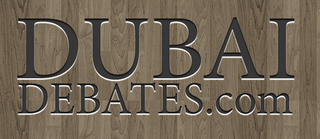
Dubai Debates is an online video debating forum based in Dubai, United Arab Emirates. According to its website, Dubai Debates offers "a platform for online opinion leaders, pundits, academics, journalists, politicians, activists and all interested users to exchange ideas through videos." In addition to video debating via its website, regular debates are also held in Dubai, bringing together opinion leaders for panel discussions.
The bipartisan Commission on Presidential Debates (CPD) held four debates for the 2012 U.S. presidential general election, slated for various locations around the United States in October 2012 – three of them involving the major party presidential nominees, and one involving the vice-presidential nominees.

A panel discussion, or simply a panel, involves a group of people gathered to discuss a topic in front of an audience, typically at scientific, business, or academic conferences, fan conventions, and on television shows. Panels usually include a moderator who guides the discussion and sometimes elicits audience questions, with the goal of being informative and entertaining. Film panels at fan conventions have been credited with boosting box office returns by generating advance buzz.
The 2016 United States presidential debates were a series of debates held for the presidential election. The Commission on Presidential Debates (CPD), a bipartisan organization formed in 1987, organized three debates among the major presidential candidates. The first of these presidential debates took place on September 26, 2016, and set the record as the most-watched debate in American history, with 84 million viewers. The second debate took place on October 9, and the third took place on October 19. All CPD debates occurred from approximately 9 p.m. to 10:30 p.m. EDT. Only the Democratic nominee Hillary Clinton and the Republican nominee Donald Trump met the criteria for inclusion in the debates, and thus were the only two to appear in the debates sponsored by the Commission on Presidential Debates. The CPD-sponsored vice presidential debate took place on October 4, 2016. Only Democratic nominee Tim Kaine and Republican nominee Mike Pence appeared in it.

A debate chamber is a room for people to discuss and debate. Debate chambers are used in governmental and educational bodies, such as a parliament, congress, city council, or a university, either for formal proceedings or for informal discourse, such as a deliberative assembly. When used for legislative purposes, a debate chamber may also be known as a council chamber, legislative chamber, or similar term. Some countries, such as New Zealand, use the term debating chamber as a formal name for the room that houses the national legislature.














